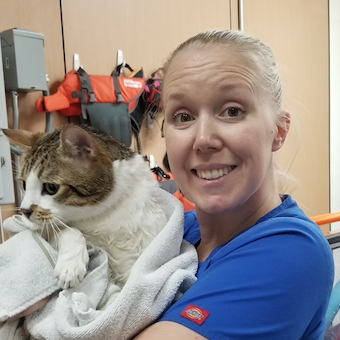77% of workers consider a company’s culture before applying to a job.
On average, happy employees are 12% more productive. And, companies with high levels of employee engagement are 22% more profitable than their competitors.
The numbers don’t lie. Good culture and happy employees actively make your business run better and more profitably.
Especially in a talent-constrained industry, there is no greater asset than your people. Your culture is a key differentiator. Make culture a core objective, and you’ll be more successful in attracting new talent and retaining top talent.
4 Steps to Making Culture a Strategic Priority
1. Define your purpose.
And this involves everyone. Management shouldn’t be the only people defining the purpose. Giving your people ownership over defining this purpose helps create a more encompassing and “real” purpose for your team.
To get started on building your purpose, you will need to place your cornerstones:
- Mission: why we do what we do
- Vision: what we hope to achieve
- Values: what we care deeply about
- Culture Code: the rules we all play by (including your clients!)
Read more in-depth about building a purpose here!
2. Engrain that purpose into your business practices.
Great! You’ve got some awesome words on paper. Now it’s time to put them into practice.
Here are some ideas:
- Put these in a mural or posters in your front office or back hallways. Remind your people (and clients) of them daily.
- Add these into your interview questions — hire for them.
- Run performance reviews with them. How are your current staff living up to these?
- Ask staff to give feedback on how leadership is living up to them. Does anyone need to adjust?
3. Evolve
Things change. Your team will evolve over time. The veterinary industry will evolve over time. The expectations of pet owners will evolve over time. And so should your culture.
Once a year, plan a big, fun meeting where you audit these and see if anything needs to be tweaked. Then, go have some fun together 😎
4. Set KPIs & monitor people metrics
What gets measured gets improved. Leaders who care about their people should measure and improve people metrics constantly. People KPIs should be set alongside financial and growth goals.
Here are some easy KPIs to start with:
- Attrition Rate
- Retention Rate
- Time to hire
- Average Tenure
- Employee referrals
- Employee Satisfaction
Want to see culture in your business improve? Integrate these people KPIs into your quarterly and yearly goals. Prioritizing these KPIs will stimulate your leadership to improve these metrics.
Want to explore more practical tips?
Check out the section on championing culture in The Ultimate Guide for Awesome Culture in Veterinary Medicine.
Want to share some of your favorite practical tips?
Collaborate on an article with us! (Email sara@hound.vet for details.)
From the Experts
From Jeremy Halperin, CIO @ Rarebreed Veterinary Partners:
“Many of our world’s top companies have found success by adhering to their core values, mission, and vision statements. Not only do these elements create the framework for the company as it grows, but they are also a promise to the teammate. Tesla is a perfect example of strong core values, mission statement and visions statement:
Core Values: doing the best, taking risks, respect, constant learning, and environmental consciousness
Mission Statement: to accelerate the world’s transition to sustainable energy
Vision Statement: to create the most compelling car company of the 21st century by driving the world’s transition to electric vehicles
This level of cohesion creates an environment where all teammates are rowing in the same direction and camaraderie flourishes. It also acts as motivation for teammates to stretch themselves and coalesce more with the company culture. When employees have alignment and understanding of the true north of a company it creates a symbiosis which ultimately empowers each employee to stretch their limits for the greater good of the team."
From Ivan Zak, CEO @ Galaxy Vets:
"Vet med champion culture cultivates autonomy, mastery and purpose.
Autonomy is making sure that people have decision latitude in their work while feeling that they have support. It’s about letting people create their own solutions to the problems they’re accountable for.
Mastery is creating the right context for self-actualization and continuous improvement that helps people get better at performing the tasks they are passionate about and have proficiency in execution.
Purpose is uniting people around a common cause — something bigger than ourselves — to make a meaningful impact through collective effort.
These are the three pillars for creating an engaging, emotionally rewarding culture fueled by intrinsic motivation where employees feel fulfilled and happy."
From Nick Vaughan, CEO @ PAZ Veterinary:
"I've always had hesitation using the word 'culture' because we use it as a stem from Cult — but a Cult tends to follow one person where as true culture is developed and cherished by many.
Culture is the fundamental reason a business finds success because you can make widgets anywhere and anyplace, but if you make those widgets about more than face value you get it… you create more value. Culture is the 'why' we do the things we do and that 'why's' impact on society. Culture is a form of carrying out a central mission that everyone can visualize and choose to subscribe.
In vet medicine, the stakes can be high due to the emotions around decision making —the family pet, the guilt from illness and the finances that are needed to make medical decisions.
Having a culture in place that involves your company’s ethos helps you make those decisions easier based on a central belief system. No one has to be on a lonely decision island but rather they can support their core values and celebrate the mission to help people and animals. It's critical that your culture envelopes compassion because that is germane to the practice of veterinary medicine.
Money cannot drive the business (no matter what an MBA will tell you) — the culture of compassion must be the north star. Culture creates better decision making and a cleaner work environment that absolves the inherent stress surrounding illness.







.gif)

